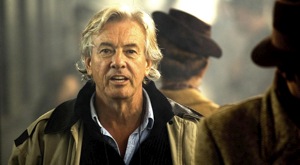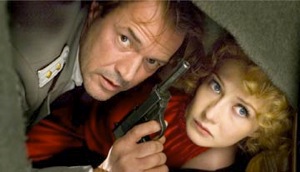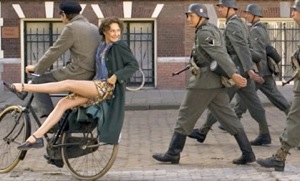-
- Assembly committee OKs same-sex marriage
- Fired transsexual Florida city manager says he won’t sue city
- Washington lawmakers pass domestic partnership bill giving rights to same-sex couples
- New Jersey same-sex couples deal with obstacles of civil unions
- Giuliani’s cross-dressing antics back in spotlight
- Las Vegas jury finds former police officer guilty of sex assault
- Lawmakers name hate crimes bill after Matthew Shepard
- National News Briefs
- World News Briefs
Arts & Entertainment
Out at the movies
Paul Verhoeven opens his ‘Black Book’
Published Thursday, 19-Apr-2007 in issue 1008
Paul Verhoeven is responsible for some of the funniest, most scabrous satires (RoboCop, Starship Troopers, Showgirls) of the past 20 years.
Two decades is also how long Verhoeven has been working exclusively in Hollywood. Black Book marks his celebrated return to Dutch cinema.
It doesn’t come as a shock to learn that the first movie to send chills up the director’s spine was a comedy. “The film I remember best is Bud Abbot and Lou Costello Meet Frankenstein,” Verhoeven laughs through his thick Dutch accent, “and I was scared to death. It was a comedy clearly, but not for me. I had nightmares from that movie for many months.”
Either through horror and/or sexual excess, a good portion of Verhoeven’s career has been spent shocking people. “It could be that basically I want to repeat that initial experience for other people,” he says. “It’s very sadistic, I think.”
“That has a little bit to do with my character,” he continues. “I’m inclined to think things out to the bottom. Be it philosophically or sexually or in any other way, I would never stop thinking and say this is too much.”
Black Book, Verhoeven’s first film in six years, is a horror movie of another sort. It vividly details the life of a beautiful Jewish singer (Carice Van Houten) forced to masquerade as a Nazi for the Dutch resistance. Before it’s over, our heroine undergoes a type of defilement the screen has not experienced since Pasolini’s Salò.
Abbott and Costello were a day at the beach compared to all the carnage Verhoeven witnessed first hand. “Violent images are kind of natural to me,” he says, pausing before diving into his childhood. “I was 6 or 7 years old in Holland during the last years of the war and remember seeing dead bodies and bombings. My block was safe, but the next street and everything beyond it was gone.”
“I wasn’t like Baghdad,” he added, “but for a child it was fascinating… threatening. I really never felt there was any sense of danger.”
Perhaps a seed of this youthful indestructibility remains. Verhoeven isn’t afraid to draw parallels between Nazi thugs and our current regime, particularly during a prison scene that clearly apes Abu Ghraib.
During the war, Verhoeven struck up a lifelong friendship with screenwriter and frequent collaborator Gerard Soeteman. The press release hinted that the two had been working on the film for more than 40 years. “Well, uh,” Verhoeven choked and chuckled, “that’s a bit exaggerated. Some of the material I used for this movie came to me when I was doing research [for a television documentary] in 1966.”
His immigration to the United States in 1985 limited contact with Soeteman. “All these years we kept coming back to this project,” he reflects. “We solved the main storyline in 2002, but as a project, the film has been in our minds since the 1980s.”
The idea for Black Book came during the making of Verhoeven and Soeteman’s other supremely engaging war melodrama, Soldier of Orange. The documentation, which shed light on the more “shadowy side” of the war, occurred years after Soldier of Orange took place, but both men filed the information for future reference.
Originally the protagonist was to be a ferry operator who helped Jews escape from occupied Holland. It wasn’t until five or six years ago that the authors decided to shift the focus to a female singer. He notes: “That helps give it extra depth. It’s not your normal script. It took time to reflect on it.”
At a recent screening held for the San Diego Jewish Film Festival, audience members questioned the execution of German soldiers after the liberation. The topic was a common one for Verhoeven. “That really happened,” he says. “The Canadians permitted Germans to kill German deserters. We found that out four years ago. “
Ironically, the first black book to appear in the film is a Bible. It isn’t until the last reel that the title Maguffin comes into play. “All the people in this film are real,” he assures me. “The little black book existed. As scholarly research points out at the moment, it contained the names of people in that book that pretended to be working for the resistance. In reality, they had also made a deal with the Germans.”
Beneath the sex and sadism beats the heart of a Hollywood studio film from the late ’50s, early ’60s. “By emphasizing the narrative, yes,” but he balked a bit when I referred to his film as a genre picture. “What genre,” he shot back. “It’s very difficult to know. It’s a love story, a survival story, part adventure, a thriller and detective story – it’s hard to typify it.”
The uninspired Hollow Man, Verhoeven’s last Hollywood film, caused the director to lose all interest in filming another science fiction or fantasy story. He is quick to agree that it is the only film in his canon to lack both personality and an edge. “After that,” he reflects, “I wanted to go somewhere else. It left me longing for something realistic.”
I’ve spent many years proudly championing Paul Verhoeven. Giant bugs, fascist robots, Vegas strippers and graphic sex scenes are no longer the easy sells they once were. I don’t remember proclaiming Paul Verhoeven the Preston Sturges of his generation, but a friend credited this quote as the sole reason he began watching the director’s film. Mr. Verhoeven is quick to validate my taste: “Take credit for it. I think it’s not a bad description, really.”
My 20 minutes with greatness are winding down. With enough notes to cover a career overview I work fast in order to sneak in a few questions concerning old favorites.
Turkish Delight and Last Tango in Paris, two films that bear striking similarities, were released within months of each other. “There was a time,” Verhoeven reminisces, “at the beginning of the so-called sexual revolution in Holland, where people were really thinking from a sexual point of view. Everything was possible. At that time and in that climate, nobody worried about a movie like Turkish Delight.” To this day it remains the most successful Dutch movie ever made.
Starship Troopers, which taught us that the root word for “arachnid” is “Iraq,” plays much better today than on its initial release. “Fortunately for me,” he pauses, “but unfortunately because it has so many implications and correspondences with what happened in the last couple of years.”
Showgirls is the greatest American sex satire since Russ Meyer and Roger Ebert’s transcendent Beyond the Valley of the Dolls. My take on the film is simple: The only participants not in on the joke were star Elizabeth Berkley and screenwriter Joe Eszterhas. Verhoeven’s laughter indicates approval. “I certainly was in on the joke,” flies from his lips. “Perhaps Elizabeth, being young, did not have the necessary distance.”
He continues: “Even if that’s true, she was heavily punished for the audacity of her performance. I think it made life miserable for her. It didn’t make my life any easier as you might imagine.”
Black Book is an exciting, exceedingly well-acted action/adventure yarn that’s much sharper and more entertaining than anything Hollywood has churned out in recent memory.
The last word on Black Book must go to the Chicago Reader’s inspirational film critic Jonathan Rosenbaum. In a sublime moment of Spielberg bashing, Mr. Rosenbaum observes, “In its dark moral complexities it puts Schindler’s List to shame.”
Amen!
|
|
Copyright © 2003-2025 Uptown Publications




